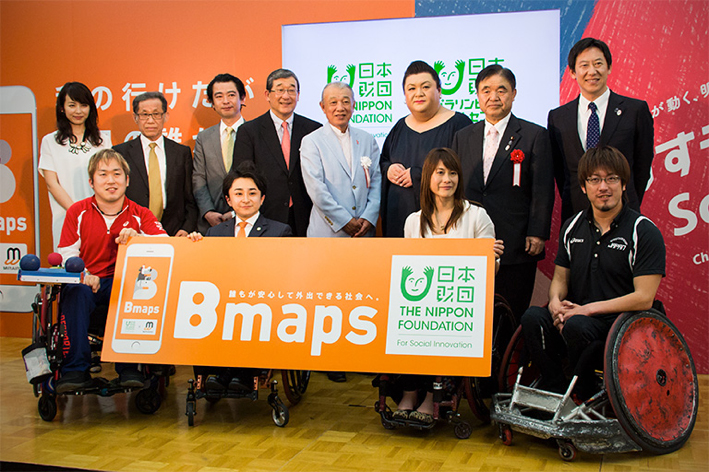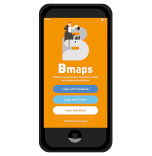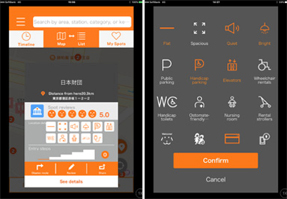Developing the Barrier-Free Map Application “Bmaps”

With the aim of creating a society in which anyone in the world can go outside and move about freely with peace of mind, The Nippon Foundation has developed and released the Bmaps barrier-free map application for a wide range of people including wheelchair users and people using baby strollers.
Overview
The Nippon Foundation has been working for many years to make information more accessible for persons with disabilities, and when Tokyo emerged as the successful bidder to host the 2020 Olympic and Paralympic Games, the Foundation decided to develop a barrier-free map application.
Planning and development of the application were commissioned to Mirairo Inc., a company that specializes in the field of universal design. Incorporating input from a variety of parties, the highly practical Bmaps application was created as a new type of barrier-free map application, and a free prototype was released in April 2016. The Nippon Foundation owns the intellectual property rights for the Bmaps application.
Users are able to submit barrier-free information for public facilities, shops, and restaurants using a simple procedure. At the time of the launch the application already had data for 16,000 locations, and this number is expected to grow to 30,000 by the official release of the full-scale version in October 2016, with a target of one million entries by 2020. Going forward, the developers hope that the application will also be used outside Japan and become a global standard.

Special Features of Bmaps
Bmaps is a service that can be used by a wide range of people, including persons with impairments, older persons, people using baby strollers, students, businesspeople, and tourists from overseas.
Most barrier-free map applications to date have only featured limited information provided by designated individuals. With Bmaps, however, anyone can easily submit information describing the features of facilities that they themselves have visited. The application covers 19 features that can be registered with the click of a screen icon, including the number of steps at the entrance, wheelchair- and ostomate-accessible rest rooms, whether guide dogs are allowed, whether credit cards or electronic money can be used, and whether free electrical outlets and public Wi-Fi are available. Users can also provide more detailed information by submitting photographs and reviews.
Information like the availability of electrical outlets that electric wheelchair users require, or whether credit cards and electronic money can be used, which is important for people who have difficulty using paper currency because of visual impairment, is also sought by businesspeople, students, and others who do not have these specific needs. The Nippon Foundation is promoting Bmaps to increase the amount of information submitted by as many people from as many backgrounds as possible, with the aim of achieving a society in which anyone can go about their daily life with peace of mind.

icons for inputting a facility’s features (right)
Multilingual Information and Overseas Development
As of the April launch, Bmaps information was available in Japanese and English. A Spanish-language version is currently being developed, and there are plans for additional languages going forward.
In June 2016, the application is being introduced at the M-Enabling Summit – Conference and Showcase 2016 in Washington D.C. and at the 9th session of the Conference of States Parties (COSP) to the United Nations Convention on the Rights of Persons with Disabilities (UNCRPD) in New York. A field test is also being planned in cooperation with the Quito city government to enhance accessibility for participants at the H-III United Nations Conference on Housing and Sustainable Urban Development to be held in Ecuador in October.
Calling for Bmaps supporters
Bmaps is an application that will become increasingly useful as more users submit information. The Nippon Foundation is therefore calling for “Bmaps supporters” to volunteer to submit barrier-free information, and plans to work with The Nippon Foundation Student Volunteer Center (Gakuvo) to have student volunteers input barrier-free information. The Foundation is also inviting other organizations to participate in Bmaps, including companies as part of their corporate social responsibility (CSR) activities and schools as part of their educational programs.
Contact
Disability and Child Welfare Team
The Nippon Foundation
- E-mail:bmaps@ps.nippon-foundation.or.jp



